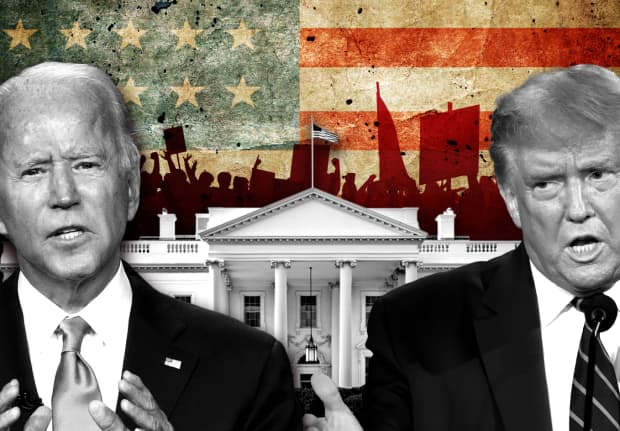This post was originally published on this site

MarketWatch photo illustration/Getty Images, iStockphoto
The chances of this November’s presidential contest becoming a contested election are abnormally high, given a COVID-related surge in mail-in ballots and frequent assertions by President Donald Trump that he might not accept the result of the election unless he wins.
The U.S. system of electing the president through the Electoral College puts state election laws and procedures in particular focus.
Here’s the MarketWatch contested-election guide:
Which states could be the focus of a contested election?
Polling and fundamental indicators show the battleground states of Pennsylvania, Florida, Wisconsin, Michigan and North Carolina have the highest chance of putting Joe Biden or Trump over the 270 electoral-vote threshold needed to secure victory, according to FiveThirtyEight.com.
Why do mail-in ballots take longer to count?
Several states, including Pennsylvania and Wisconsin, don’t allow election officials to begin processing mail-in ballots before Election Day. Processing, or pre-canvassing, means taking action to prepare ballots to be counted, like verifying voters’, and in some cases witnesses’, signatures on envelopes. In many states, including Pennsylvania, it also involves checking that ballots are enclosed in a second “secrecy envelope” within the mailing envelope. Finally, processing includes removing ballots from envelopes and stacking them in preparation for the count.
“All of these things sound like small steps, but added up over millions of ballots it comes to a significant amount of time,” Richard Pildes, a constitutional-law scholar at New York University, told MarketWatch. “The more delay in getting to a final and complete account, the greater the likelihood that there will be tremendous conflict over these votes.”
Which states are likely to take a long time to complete vote counts?
A stalemated, partisan battle over election laws has left Pennsylvania unprepared for a surge in mailed votes, Daniel J. Mallinson, a public-policy professor at Penn State Harrisburg, said in an interview.
In the primaries, when 1.5 million ballots were cast by mail, it took nearly a week to come to an accurate count in some races. In the general election, Pennsylvania expects to receive 2.5 million absentee ballots, but the commonwealth government has been unable to come to an agreement to allow for early processing of votes or expand resources available to counties for tallying ballots.
“The biggest concern is there is a long delay in being able to give a confident counting of the vote,” Mallinson said.
In Michigan and Wisconsin, too, partisan conflict has prevented laws from being amended in a manner that would allow the prompt tallying of mailed ballots.
What could be the consequences of a significant delay in ballot counting?
Federal election law stipulates two important deadlines by which state election results must be completed. One is Dec. 8, when states are supposed to send election results to the Archivist of the United States, and a second is Dec. 14, when the resulting Electoral College delegations are to cast their votes.
Between Election Day and these dates, it is conceivable that one side or the other could engage in legal maneuvers that potentially delay the counting of votes to the point that not every ballot can be counted in time, NYU’s Pildes said.
Why are mail-in ballots more likely to be contested?
Mail-in votes are far more likely to be declared invalid because many states have complicated protocols for how voters must fill out and mail ballots.
In North Carolina, for instance, there has been litigation over a state law requiring that absentee ballots include a witness’s signature on the ballot envelope to be valid, and many voters aren’t following this protocol. A political group representing retirees has sued to force the state to allow voters to amend their ballots if they’ve submitted them without witness signatures.
Why does a delayed count increase the chances of a contested election?
If the result of a state’s voting remains in dispute by the time the Electoral College meets, state legislatures and governors could become key actors. Federal law dictates that if a state election has “failed,” then state legislatures can step in and choose a slate of electors to vote for its candidate of choice. Pennsylvania, Florida, Wisconsin, Michigan and North Carolina all have legislatures controlled by the Republican Party.
But in such a scenario, it is ultimately the responsibility of the new Congress, which takes office on Jan. 3, to decide whether to certify a particular slate of electors. “Basically the rule is that if both houses of Congress agree to count or reject a state’s electors, they have the power to do that,” Pildes said.
If the two chambers of Congress can’t agree, then one reading of the pertinent federal law, the Electoral Count Act of 1887, says that the state “executive,” which may be interpreted as the governor of the state, would decide who the real electors are. Pennsylvania, Wisconsin, Michigan and North Carolina all have Democratic governors.
But the law is vague in its language and open to interpretations that could even lead to multiple quasi-legitimate claimants to the presidency.
Which parties would be fighting these issues out in court?
Hundreds of election-related lawsuits have already been filed in courts across the country, brought by state, local and national political parties, as well as by individual citizens, outside advocacy groups and campaigns themselves. The Trump administration has brought several suits against states to limit efforts to collect mail-in ballots, challenge poll-watching laws and more.
In a close election, look for these suits to continue to proliferate.


